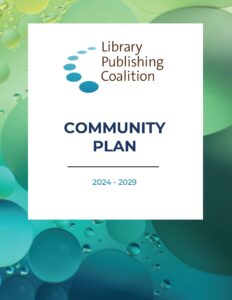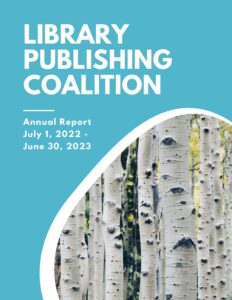November 28, 2023
By Nancy Adams
On behalf of the LPC Board, we are delighted to announce that the recipient of the 2023 LPC Award for Exemplary Service is Ally Laird, Open Publishing Program Coordinator for Penn State University Libraries. The Award recognizes substantial contributions by an LPC community member to advancing the mission, vision, and values of the Library Publishing Coalition.
Ally was nominated for her significant contributions as Treasurer of the LPC Board during the previous two program years. During this time LPC made substantial changes to its financial structures and processes. Ally supported the Board and the community throughout this challenging transition with diligent analysis and clear communication and, as mentioned in her nomination, “ the end results – solid financial processes, steady membership, and community goodwill – owe much to her work.”
A statement from Ally:
 “I feel extremely humbled and honored to have been awarded LPC’s Award for Exemplary Service this year. It was a true pleasure to serve on LPC’s Board and while the work I did as the Treasurer over the past two years, and last year especially, was challenging, I am thankful for the opportunity to help serve our community. The care, thoughtfulness, and support that my fellow Board members and the community provided during the challenging season of having to rethink our financial model and increase our dues for the first time was so exemplary and made my job much easier than it could have been. It’s a beautiful example of why I love and value this community so much! I have grown significantly through my service as Treasurer, and I’m thankful that I was given the opportunity to help our community navigate through this change and help to position the LPC for continued success and stability for years to come. Thank you!”
“I feel extremely humbled and honored to have been awarded LPC’s Award for Exemplary Service this year. It was a true pleasure to serve on LPC’s Board and while the work I did as the Treasurer over the past two years, and last year especially, was challenging, I am thankful for the opportunity to help serve our community. The care, thoughtfulness, and support that my fellow Board members and the community provided during the challenging season of having to rethink our financial model and increase our dues for the first time was so exemplary and made my job much easier than it could have been. It’s a beautiful example of why I love and value this community so much! I have grown significantly through my service as Treasurer, and I’m thankful that I was given the opportunity to help our community navigate through this change and help to position the LPC for continued success and stability for years to come. Thank you!”
Ally will receive a complimentary registration to this year’s Library Publishing Forum and a $500 honorarium. She will also be recognized at the Forum.
Please join us in congratulating Ally!
On behalf of the LPC Board
Amanda Hurford, President
Perry Collins, President-Elect
Sonya Betz, Secretary
Justin Gonder, Treasurer
Harrison Inefuku, DEI Officer
Angel Peterson
Elizabeth Scarpelli
Janet Swatscheno
Emma Molls, Past President
 LPC is excited to announce the publication of our new Community Plan, which will guide our activities from 2024 to 2029. Based on deep engagement with the community over the last year, this brief document centers on four areas of focus:
LPC is excited to announce the publication of our new Community Plan, which will guide our activities from 2024 to 2029. Based on deep engagement with the community over the last year, this brief document centers on four areas of focus:
 “I feel extremely humbled and honored to have been awarded LPC’s Award for Exemplary Service this year. It was a true pleasure to serve on LPC’s Board and while the work I did as the Treasurer over the past two years, and last year especially, was challenging, I am thankful for the opportunity to help serve our community. The care, thoughtfulness, and support that my fellow Board members and the community provided during the challenging season of having to rethink our financial model and increase our dues for the first time was so exemplary and made my job much easier than it could have been. It’s a beautiful example of why I love and value this community so much! I have grown significantly through my service as Treasurer, and I’m thankful that I was given the opportunity to help our community navigate through this change and help to position the LPC for continued success and stability for years to come. Thank you!”
“I feel extremely humbled and honored to have been awarded LPC’s Award for Exemplary Service this year. It was a true pleasure to serve on LPC’s Board and while the work I did as the Treasurer over the past two years, and last year especially, was challenging, I am thankful for the opportunity to help serve our community. The care, thoughtfulness, and support that my fellow Board members and the community provided during the challenging season of having to rethink our financial model and increase our dues for the first time was so exemplary and made my job much easier than it could have been. It’s a beautiful example of why I love and value this community so much! I have grown significantly through my service as Treasurer, and I’m thankful that I was given the opportunity to help our community navigate through this change and help to position the LPC for continued success and stability for years to come. Thank you!”

